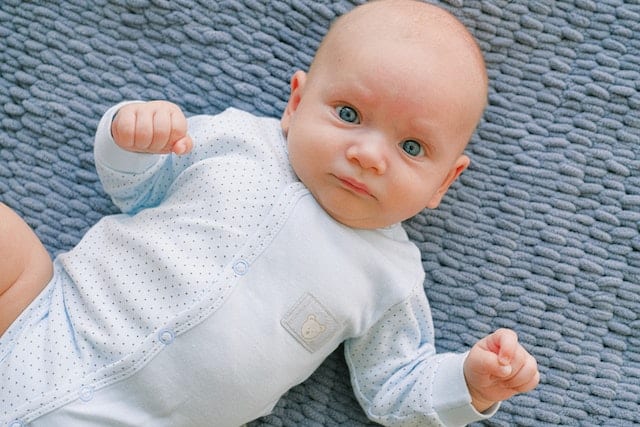Baby eyes rolling back can be a concerning sight for parents and caregivers. While it may seem alarming, it is actually a normal and common occurrence in infants. Babies are born with immature nervous systems, and their eyes and brain are still developing. As a result, they may display a variety of eye movements, including rolling back, that can be perfectly normal.
Understanding Baby Eyes Rolling Back can help parents and caregivers recognize when it is normal and when it may indicate a problem. Normal Eye Movements in Babies can include rolling back, side-to-side, and up-and-down movements. These movements can be a sign that the baby is exploring their environment and developing their visual skills. However, if the eye rolling is accompanied by other symptoms or warning signs, it may be a cause for concern.
Key Takeaways
- Baby eyes rolling back is a normal and common occurrence in infants.
- Normal eye movements in babies can include rolling back, side-to-side, and up-and-down movements.
- If eye rolling is accompanied by other symptoms or warning signs, it may be a cause for concern.
Understanding Baby Eyes Rolling Back

Eye-rolling is a common phenomenon in babies, but it can be alarming for parents who witness it for the first time. In most cases, eye-rolling is normal and nothing to worry about. However, in some cases, it can be a sign of an underlying medical condition.
1. Normal Eye-Rolling
Babies are born with underdeveloped eye muscles and nervous systems, which means that their eyes may roll back involuntarily. This is particularly common in newborns. In most cases, this is a normal part of development and nothing to worry about. As the baby grows and their nervous system matures, the eye-rolling will become less frequent.
2. Abnormal Eye-Rolling
In some cases, eye-rolling can be a sign of an underlying medical condition. If your baby’s eye-rolling is accompanied by other symptoms, such as seizures or a loss of consciousness, it’s important to seek medical attention immediately. Some of the medical conditions that can cause abnormal eye-rolling in infants include:
- Epilepsy
- Meningitis
- Encephalitis
- Hydrocephalus
- Brain tumors
3. When to Seek Medical Attention
If your baby’s eye-rolling is persistent, accompanied by other symptoms, or if you’re concerned, it’s important to seek medical attention. Your pediatrician will be able to assess your baby and determine whether there is an underlying medical condition that needs to be addressed.
In conclusion, eye-rolling is a common phenomenon in babies, particularly in newborns. In most cases, it’s a normal part of development and nothing to worry about. However, if your baby’s eye-rolling is persistent or accompanied by other symptoms, it’s important to seek medical attention to rule out any underlying medical conditions.
Normal Eye Movements in Babies

Babies are born with underdeveloped visual systems that continue to mature over the first few months of life. As a result, their eye movements may appear different from those of adults. However, most of these movements are normal and essential for healthy visual development.
One of the most common eye movements in babies is called “nystagmus,” which is a rapid, involuntary movement of the eyes that can be side-to-side, up-and-down, or circular. Nystagmus is often most noticeable when a baby is tired or trying to focus on an object. In most cases, this type of eye movement is normal and does not require treatment.
Another normal eye movement in babies is called “saccades,” which are quick, jerky movements of the eyes that allow a baby to shift their gaze from one object to another. Saccades are essential for developing eye-hand coordination and tracking moving objects.
Babies may also exhibit “fixation,” which is the ability to focus on an object and keep their eyes still for a short period. As their visual system develops, babies will be able to fixate on objects for longer periods of time.
Lastly, “convergence” is another normal eye movement in babies that allows the eyes to turn inward to focus on an object that is close up. This movement is important for developing depth perception and binocular vision.
In summary, while baby eye movements may appear different from those of adults, most of them are normal and essential for healthy visual development. Parents should consult with their pediatrician if they have concerns about their baby’s eye movements or notice any sudden changes.
Causes of Eye Rolling in Babies
Eye rolling in babies can be a normal developmental process or a sign of an underlying medical condition. Some of the common causes of eye rolling in babies are:
- Normal Developmental Process: Eye rolling in babies can be a normal developmental process, especially during the first few months of life. This is because the baby’s brain is still developing, and their eyes are learning to work together. As a result, the baby’s eyes may roll back involuntarily at times.
- Seizures and Epilepsy: Seizures and epilepsy can cause eye rolling in babies. Seizures are a sudden and uncontrolled electrical disturbance in the brain. They can cause the baby’s eyes to roll back and the body to stiffen or jerk. Epilepsy is a neurological disorder that causes recurrent seizures.
- Fever and Infections: High fever and infections can cause eye rolling in babies. Fever can cause the baby’s eyes to roll back, and infections can cause inflammation in the brain, leading to seizures and eye rolling.
- Strabismus: Strabismus is a condition in which the eyes do not align properly. It can cause the baby’s eyes to roll back as they try to focus on objects.
- Head Injuries: Head injuries can cause eye rolling in babies. If the baby hits their head, it can cause bleeding in the brain, leading to seizures and eye rolling.
- Hypoglycemia: Low blood sugar can cause eye rolling in babies. This is because the brain needs glucose to function properly, and low blood sugar can cause seizures and eye rolling.
- West Syndrome: West Syndrome is a rare form of epilepsy that occurs in infants. It can cause eye rolling, as well as other symptoms such as spasms, developmental delays, and intellectual disabilities.
- Genetic and Medical Conditions: Some genetic and medical conditions can cause eye rolling in babies. For example, cerebral palsy is a neurological condition that can cause involuntary movements, including eye rolling. Other neurological disorders and brain injuries can also cause eye rolling in babies.
- Febrile Seizures: Febrile seizures are seizures that occur in babies and young children due to high fever. They can cause eye rolling, as well as other symptoms such as stiffening or jerking of the body.
In conclusion, eye rolling in babies can be a normal developmental process or a sign of an underlying medical condition. It is important to seek medical attention if the eye rolling is frequent or accompanied by other symptoms.
Symptoms and Warning Signs
When a baby’s eyes roll back, it can be a concerning sight for parents. However, it is not always a cause for alarm. In some cases, it may be a normal reflex or a sign of sleepiness. However, there are certain warning signs that parents should be aware of.
One of the most common warning signs is irregular breathing. If a baby’s breathing becomes shallow or stops altogether, it can be a sign of a serious condition. Other warning signs include jerky body movements, loss of consciousness, crying, crossed eyes, limb stiffening, convulsions, shivering, and jerking movements.
If a baby experiences any of these symptoms, it is important to seek medical attention right away. These symptoms can be a sign of a serious condition such as epilepsy, meningitis, or a brain injury.
In addition to these warning signs, there are other signs and symptoms that parents should be aware of. For example, if a baby’s eyes roll back and they also experience stiffening of the body or blurry vision, it can be a sign of a seizure. If a baby’s eyes cross frequently, it may be a sign of a vision problem.
It is important to note that not all babies will exhibit these symptoms when their eyes roll back. Some babies may simply be tired or experiencing a normal reflex. However, if parents are concerned about their baby’s eyes rolling back, they should always consult with a healthcare provider to rule out any underlying conditions.
Sleep and Eye Rolling

During sleep, it is common for a baby’s eyes to roll back. This happens because during deep sleep, the muscles that control eye movement relax, causing the eyes to roll back. This is a normal part of the sleep cycle and is not a cause for concern.
Eye rolling during active sleep, also known as rapid eye movement (REM) sleep, is also normal. During this stage of sleep, the brain is highly active and the eyes move rapidly. This is when most dreaming occurs.
It is important to note that eye rolling during sleep is not a sign of a seizure. Seizures are characterized by repetitive, uncontrolled movements, including eye movements, that last for several seconds or more.
Parents may notice their baby’s eyes rolling back during sleep and become concerned. However, it is important to remember that this is a normal part of the sleep cycle and does not indicate any health problems.
If parents are concerned about their baby’s sleep patterns or eye movements during sleep, they should speak with their pediatrician. The pediatrician can provide guidance and reassurance about what is normal and what may require further evaluation.
How Parents Can Help
When a baby’s eyes roll back, it can be a scary experience for parents. While it is not uncommon for babies to have their eyes roll back, it is important for parents to know how to help their baby when this happens.
One thing parents can do is to try and control the environment around the baby. This means reducing any loud noises or bright lights that may be causing the baby to become overstimulated. This can help reduce the likelihood of the baby’s eyes rolling back.
Another thing parents can do is to encourage their baby to yawn. Yawning can help regulate the baby’s breathing and heart rate, which can help prevent the baby’s eyes from rolling back. Parents can gently stroke their baby’s cheek or forehead to encourage them to yawn.
It is important for parents to remain calm when their baby’s eyes roll back. Panicking or becoming upset can cause the baby to become more agitated, which can make the situation worse. Instead, parents should remain calm and try to soothe their baby by talking to them in a soft and gentle voice.
In summary, when a baby’s eyes roll back, parents can help by controlling the environment around the baby, encouraging them to yawn, and remaining calm. By taking these steps, parents can help their baby feel more comfortable and reduce the likelihood of their eyes rolling back in the future.
Healthcare Provider’s Role
When a baby’s eyes roll back, it is important for healthcare providers to identify the underlying cause and provide appropriate treatment. The role of healthcare providers may vary depending on the severity and cause of the eye rolling.
Pediatricians are often the first point of contact for parents who notice their baby’s eyes rolling back. They may perform a physical exam and ask questions about the baby’s medical history. Depending on the findings, they may refer the baby to a specialist such as a neurologist.
Healthcare providers, including pediatricians and neurologists, may order diagnostic tests such as an electroencephalogram (EEG) or magnetic resonance imaging (MRI) to help determine the cause of the eye rolling. They may also prescribe medications to treat underlying conditions such as seizures or neurological disorders.
In emergency situations, such as when a baby experiences prolonged seizures or loses consciousness, parents should seek immediate medical attention. Emergency services may administer medication to stop seizures and stabilize the baby’s condition.
Overall, healthcare providers play a crucial role in identifying and treating the underlying causes of baby eye rolling. By working together with parents and specialists, they can help ensure the best possible outcomes for babies experiencing this symptom.
Treatment Options for Eye Rolling

When it comes to treating eye rolling in babies, there are several options available. The treatment option chosen will depend on the underlying cause of the eye rolling.
1. Non-Medical Treatment Options
In many cases, non-medical treatment options are sufficient to treat eye rolling in babies. These options include:
- Changing the baby’s position: If the eye rolling is due to the baby being uncomfortable, changing the baby’s position can often help. For example, if the baby is lying on their back, try turning them onto their side.
- Using a pacifier: If the eye rolling is due to the baby being overstimulated, using a pacifier can often help to calm them down.
- Reducing noise and light: If the eye rolling is due to the baby being overstimulated, reducing noise and light in the environment can often help to calm them down.
2. Medical Treatment Options
If non-medical treatment options are not effective, medical treatment options may be necessary. These options include:
- Medication: If the eye rolling is due to a medical condition, medication may be necessary to treat the underlying condition. For example, if the eye rolling is due to seizures, anti-seizure medication may be prescribed.
- Surgery: In rare cases, surgery may be necessary to treat the underlying cause of the eye rolling. For example, if the eye rolling is due to a brain tumor, surgery may be necessary to remove the tumor.
It is important to note that the best treatment option will depend on the underlying cause of the eye rolling. Therefore, it is important to consult with a healthcare provider to determine the best course of action.
Eye Conditions and Disorders
Babies are born with eyes that are not fully developed. As their eyes mature, they learn to focus and track objects. However, sometimes babies may experience eye conditions and disorders that can affect their vision.
1. Nystagmus
Nystagmus is a condition where the eyes make repetitive and uncontrolled movements. It can be present at birth or acquired later in life. In babies, nystagmus can be a sign of an underlying neurological or developmental disorder. Treatment options include glasses, eye patches, and surgery.
2. Lazy Eye
Lazy eye, also known as amblyopia, is a condition where one eye does not develop properly. This can cause the brain to favor the stronger eye, leading to poor vision in the weaker eye. Treatment options include glasses, eye patches, and vision therapy.
3. Crossed Eyes
Crossed eyes, also known as strabismus, is a condition where the eyes do not align properly. This can cause double vision and poor depth perception. Treatment options include glasses, eye patches, and surgery.
4. Acquired Nystagmus
Acquired nystagmus is a type of nystagmus that develops later in life. It can be caused by a variety of factors, including head trauma, medications, and neurological disorders. Treatment options depend on the underlying cause.
5. Eye Problems
Other eye problems that can affect babies include cataracts, glaucoma, and retinopathy of prematurity. It is important to have regular eye exams to detect and treat any potential problems early on.
In summary, babies can experience a variety of eye conditions and disorders that can affect their vision. It is important to have regular eye exams and seek treatment if any issues are detected.
Developmental Milestones and Eye Rolling
As infants grow and develop, they reach various developmental milestones that are important for their overall growth and wellbeing. One such milestone is the ability to control eye movements and focus on objects in their environment.
Eye rolling is a common phenomenon in infants and can be caused by a variety of factors. In some cases, it may be a sign of infantile spasms, a type of seizure disorder that typically begins in the first year of life. However, most of the time, eye rolling is simply a normal part of a baby’s development.
Around 2-3 months of age, infants begin to develop better control over their eye movements and can track objects with their eyes. They may also begin to roll their eyes in response to stimuli or when they are tired or bored. This is a normal part of their development and is nothing to be concerned about.
By 6 months of age, most infants have developed the ability to focus on objects and follow them with their eyes. They can also track moving objects and may begin to reach for them. At this stage, eye rolling is less common and may only occur in response to extreme fatigue or stress.
Overall, eye rolling is a normal part of an infant’s development and is not usually a cause for concern. However, if parents notice any other unusual symptoms or behaviors, such as prolonged eye rolling or spasms, they should consult with their pediatrician to rule out any underlying medical conditions.
Other Relevant Information
There are several factors to consider when a baby’s eyes roll back. The color of a baby’s eyes is not a significant factor in this situation. However, body temperature can play a role. If a baby is overheated or experiencing a fever, their eyes may roll back as a result.
It is also important to consider the baby’s overall health. Certain health conditions, such as seizures or neurological disorders, can cause a baby’s eyes to roll back. If a baby is experiencing other symptoms along with the eye rolling, it is essential to seek medical attention immediately.
It is a common misconception that all babies are born with perfect 20/20 vision. In reality, it takes several months for a baby’s eyesight to fully develop. If a baby’s eyes are rolling back, it is possible that they are experiencing vision problems. An eye exam by a pediatric ophthalmologist can help determine if this is the case.
The American Academy of Ophthalmology recommends that all babies receive their first eye exam between 6 and 12 months of age. This exam can help detect any vision problems early on and ensure proper treatment.
In summary, several factors can contribute to a baby’s eyes rolling back. It is essential to consider the baby’s overall health, body temperature, and vision development. If a baby is experiencing other symptoms or has not yet had an eye exam, it is crucial to seek medical attention.
Related: Why Do Babies Roll Their Eyes
Frequently Asked Questions
What causes a baby’s eyes to roll back?
Babies may roll their eyes back for a variety of reasons, including fatigue, boredom, or even excitement. However, if the eye rolling is accompanied by other symptoms such as stiffness, weakness, or seizures, it may be a sign of a more serious underlying condition.
When should I be concerned about my baby’s eye rolling?
If your baby’s eye rolling is accompanied by other symptoms such as stiffness, weakness, or seizures, it may be a sign of a more serious underlying condition. In such cases, it is recommended to seek medical attention immediately.
Is eye rolling a sign of a seizure in babies?
Eye rolling can be a sign of a seizure in babies, especially if it is accompanied by other symptoms such as stiffness, weakness, or jerking movements. However, not all eye rolling is a sign of a seizure, and it is important to consult a medical professional to determine the cause.
How long do babies typically roll their eyes back?
The duration of eye rolling in babies can vary depending on the cause. If it is due to fatigue or boredom, it may only last a few seconds. However, if it is a sign of a more serious underlying condition, it may last longer or occur more frequently.
Are there any treatments for a baby’s eyes rolling back?
The treatment for a baby’s eye rolling depends on the underlying cause. If it is due to fatigue or boredom, simply redirecting the baby’s attention may be enough. However, if it is a sign of a more serious underlying condition, medical treatment may be necessary.
Do all babies experience eye rolling at some point?
Eye rolling is a common behavior in babies and is not always a cause for concern. However, if it is accompanied by other symptoms such as stiffness, weakness, or seizures, it may be a sign of a more serious underlying condition.

Iesha is a loving mother of 2 beautiful children. She’s an active parent who enjoys indoor and outdoor adventures with her family. Her mission is to share practical and realistic parenting advice to help the parenting community becoming stronger.
